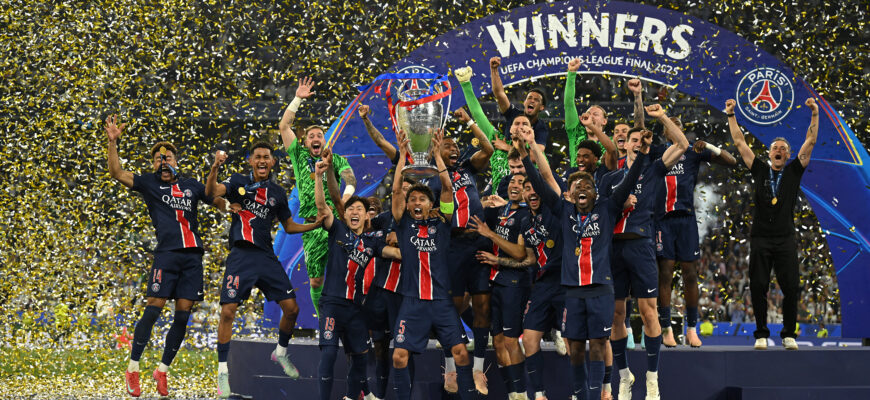Since the 2011 acquisition by Qatar Sports Investments, a branch of Qatar`s sovereign wealth fund, Paris Saint-Germain had cultivated a rather negative reputation in Europe. For a long time, PSG were often perceived as a wasteful, disorganized, and indifferent collection of excessively paid and valued footballers. Their consistent presence in the Champions League was seen merely as a given, thanks to their dominance in Ligue 1.
Regarding their performance in Europe`s premier club competition, PSG frequently fell short of expectations, even earning the label of `big-time bottlers`. The notorious `Remontada` against Barcelona in 2017 and the second-half collapse at Santiago Bernabéu in 2022 stand out as prime examples of these failures. Such setbacks made PSG a subject of mockery across Europe. In 2023, PSG replaced Christophe Galtier with Luis Enrique, whose initial significant move was to inform Neymar Jr. and Marco Verratti, two long-standing figures of the QSI era, that they were free to leave. From this point, PSG began to transform into a team that was finally seen as likable on their journey towards Saturday`s Champions League final.
Luis Enrique`s Impact
Over the years, PSG has been managed by highly-regarded coaches like Carlo Ancelotti, Thomas Tuchel, and Mauricio Pochettino. However, arguably none has had a more profound impact than the former Spain national team manager. Luis Enrique has successfully molded an underperforming group into a coherent and formidable unit. The former Barcelona head coach has effectively created a team that mirrors his own traits: confident, energetic, disciplined, and tactically astute.
The sense of unity Luis Enrique has instilled is evident in the attacking players` willingness to track back and support their teammates, a commitment rarely seen when Lionel Messi, Neymar, and Kylian Mbappé played together. Luis Enrique has also been instrumental in bringing out the best in players reaching their peak years, such as Gianluigi Donnarumma, Achraf Hakimi, and particularly Ousmane Dembélé, whose successful adaptation from a dynamic right winger to a clinical central forward was entirely unexpected.
The Spaniard`s coaching style, his impressive results, his effort to learn French, his capacity for self-reflection on past errors, and the dignity with which he navigated personal difficulties all command respect.
A Coherent Sporting Strategy
One frequent criticism leveled against PSG before recent years was the apparent misalignment between the team`s actual requirements and the players signed. The most striking illustration of this was the acquisition of free agent Lionel Messi in 2021. Signing the Argentine icon seemed to lack any clear sporting rationale, and his two-year tenure can be considered a failure, both for himself and for the club. A similar assessment could be made of Sergio Ramos`s signing.
Fortunately, it appears valuable lessons have been learned. Under the guidance of Sporting Director Luis Campos, PSG has shifted away from the era of signing `bling-bling` superstars towards a policy centered on youth development and a focus on French players, whose motivation to represent the nation`s leading club is unquestionable. This strategic shift has not been without its challenges or less successful transfers. Two years ago, PSG invested heavily in Randal Kolo Muani (€90m) and Manuel Ugarte (€60m), and offered high wages to free agents Milan Skriniar and Marco Asensio.
However, more recent transfer windows have demonstrated PSG`s improved strategic approach. They signed João Neves from Benfica for €60m, significantly below his release clause, and subsequently sold Ugarte – whose tendency to commit fouls and perceived slowness proved ill-suited to Luis Enrique`s system – for a comparable fee. Neves has proven to be an outstanding success, as has Désiré Doué.
While PSG undeniably remains a state-backed club with substantial financial resources, they are now viewed as more adept and serious operators in the transfer market. Furthermore, the Ligue 1 champions are not hesitant to make significant investments when a promising market opportunity arises that is too good to overlook, such as the potential acquisition of Napoli`s talented winger, Khvicha Kvaratskhelia.
A New Work Ethic
The integration of players like the Georgian winger, Kvaratskhelia, who quickly settled into the squad, perfectly embodies the new ethos at PSG. Kvaratskhelia combines elements of classic flair – with his distinctive look and exceptional dribbling – with the demands of the modern winger. He is a selfless and relentlessly hard-working player, demonstrated by his comprehensive performance against Arsenal in the Champions League semi-finals. In that match at the Emirates Stadium, Kvaratskhelia set up Dembélé`s opening goal, won possession back more times than any other player on the pitch, and provided crucial defensive support to Nuno Mendes in neutralizing his direct opponent, Bukayo Saka.
The collective willingness of PSG players to work together is also clearly visible in the fluid and interchangeable positioning of their front three, which makes them even harder to predict for opponents. Liverpool captain Virgil van Dijk – widely regarded as one of the world`s best center-backs – recently expressed his admiration for the playing style and the sheer effort displayed by Les Parisiens when the two teams met in the Champions League knockout stages.
Just a couple of years ago, it`s likely that PSG would have struggled or even lost in a high-pressure match within an intensely hostile atmosphere like Anfield`s. But this current iteration of PSG – energetic, tireless, and youthful – is fundamentally different. And while they aimed to become the second French side to lift Europe`s most coveted trophy on Saturday night, even if they didn`t succeed, they have undeniably gained something they severely lacked before: genuine likability and the respect of their rivals.








